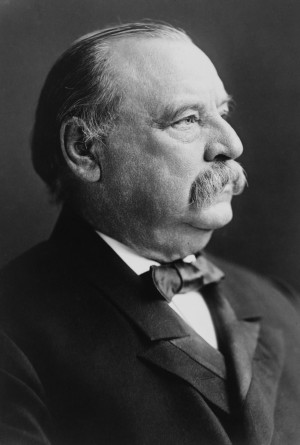Grover Cleveland (Stephen Grover Cleveland)

Grover Cleveland
22nd and 24th United States President, New York Governor. A Democrat, he was first elected President in 1884, defeated in 1888, and reelected in 1892, becoming the only United States President to serve two non-consecutive terms. One of nine children of a Presbyterian minister, he was raised in upstate New York, becoming a lawyer in Buffalo. At age 44, he was elected Mayor of Buffalo in 1881, and later became Governor of New York. In 1885, he ran for President, and won with the support of Democrats and reform Republicans (called by the press, “Mugwumps” because of their dislike for Republican James G. Blaine). A bachelor, he was initially ill at ease with the social aspects of the job, and in June 1886, he married 21-year-old Frances Folsom; making him the first United States President to be married in the White House. He did not believe in the spoils system, and brought integrity to the office of the President. He vetoed many private pension bills to pay fraudulent claims for former Union veterans of the Civil War, vetoed a bill to grant veterans pensions for disabilities not caused by military service, and vetoed any bill that he thought would grant special favors to a specific group. Vetoing a bill to give seed money to drought-stricken farmers in Texas, he wrote, “Federal aid in such cases encourages the expectation of paternal care on the part of the Government and weakens the sturdiness of our national character.” In December 1887, he asked Congress to reduce high protective tariffs. Cleveland was defeated in the election of 1888 by Republican candidate Benjamin Harrison, but had received more popular votes than Harrison, losing on the electoral vote count. Running again in 1892, Cleveland won the election, but faced an immediate crisis of an acute economic depression in the country. Dealing through the Treasury Department rather than address individual business failures, he obtained repeal of the inflationary Sherman Silver Purchase Act, and maintained the Treasury’s gold reserve. When railroad workers struck in Chicago, violating a federal injunction against strikes, he sent the Army to Chicago to enforce the law. Cleveland also forced Great Britain to accept arbitration in a boundary dispute with Venezuela. His economic policies were becoming generally unpopular and in 1896, his party deserted him, nominating instead William Jennings Bryan for President. After leaving the White House, he retired to Princeton, New Jersey, where he died in 1908.
Born
- March, 18, 1837
- Caldwell, New Jersey
Died
- June, 24, 1908
- Princeton, New Jersey
Cause of Death
- heart attack
Cemetery
- Princeton Cemetery
- Princeton, New Jersey


